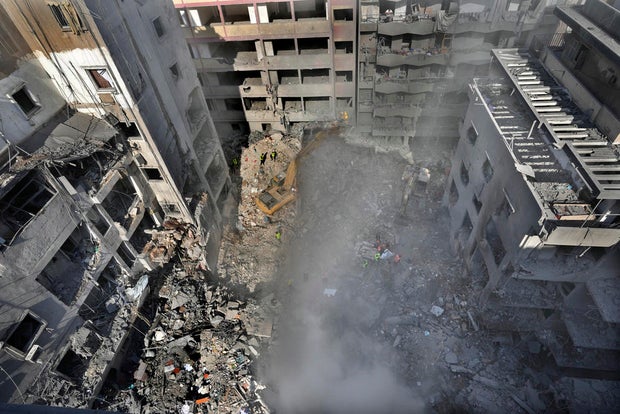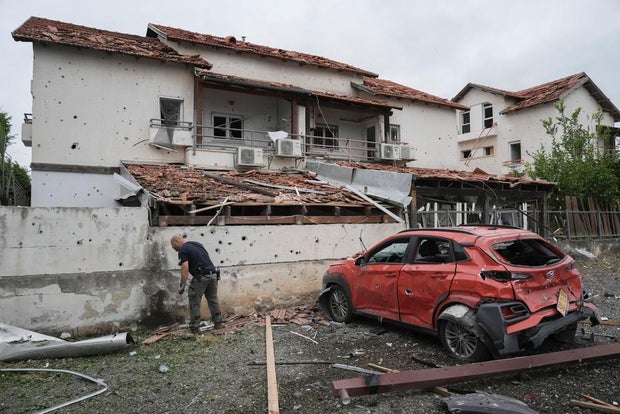CBS News
Book excerpt: “The Ministry of Time” by Kaliane Bradley

Simon & Schuster
We may receive an affiliate commission from anything you buy from this article.
A delightful mix of historical fact and science fiction, Kaliane Bradley’s debut novel “The Ministry of Time” (Simon & Schuster) mixes historical fact and science fiction in the story of a secret British agency that plucks doomed people from the past.
Read an excerpt below.
“The Ministry of Time” by Kaliane Bradley
Prefer to listen? Audible has a 30-day free trial available right now.
The interviewer said my name, which made my thoughts clip. I don’t say my name, not even in my head. She’d said it correctly, which people generally don’t.
“I’m Adela,” she said. She had an eye patch and blond hair the same color and texture as hay.
“I’m the Vice Secretary.”
“Of …?”
“Have a seat.”
This was my sixth round of interviews. The job I was interviewing for was an internal posting. It had been marked SECURITY CLEARANCE REQUIRED because it was gauche to use the TOP SECRET stamps on paperwork with salary bands. I’d never been cleared to this security level, hence why no one would tell me what the job was. As it paid almost triple my current salary, I was happy to taste ignorance. I’d had to produce squeaky-clean grades in first aid, Safeguarding Vulnerable People, and the Home Office’s Life in the UK test to get this far. I knew that I would be working closely with refugees of high-interest status and particular needs, but I didn’t know from whence they were fleeing. I’d assumed politically important defectors from Russia or China.
Adela, Vice Secretary of God knows what, tucked a blond strand behind her ear with an audible crunch.
“Your mother was a refugee, wasn’t she?” she said, which is a demented way to begin a job interview.
“Yes, ma’am.” “Cambodia,” she said. “Yes, ma’am.”
I’d been asked this question a couple of times over the course of the interview process. Usually, people asked it with an upward lilt, expecting me to correct them, because no one’s from Cambodia. You don’t look Cambodian, one early clown had said to me, then glowed like a pilot light because the interview was being recorded for staff monitoring and training purposes. He’d get a warning for that one. People say this to me a lot, and what they mean is: you look like one of the late-entering forms of white—Spanish maybe—and also like you’re not dragging a genocide around, which is good because that sort of thing makes people uncomfortable.
There was no genocide-adjacent follow-up: Any family still there [understanding moue]? Do you ever visit [sympathetic smile]? Beautiful country [darkening with tears]; when I visited [visible on lower lid] they were so friendly. …
Adela just nodded. I wondered if she’d go for the rare fourth option and pronounce the country dirty.
“She would never refer to herself as a refugee, or even a former refugee,” I added. “It’s been quite weird to hear people say that.”
“The people you will be working with are also unlikely to use the term. We prefer ‘expat.’ In answer to your question, I’m the Vice Secretary of Expatriation.”
“And they are expats from …?”
“History.”
“Sorry?”
Adela shrugged. “We have time-travel,” she said, like someone describing the coffee machine. “Welcome to the Ministry.”
From “The Ministry of Time” by Kaliane Bradley. Copyright © 2024 by Kaliane Bradley. Excerpted with permission by Simon & Schuster, a division of Simon & Schuster, Inc.
Get the book here:
“The Ministry of Time” by Kaliane Bradley
Buy locally from Bookshop.org
For more info:
CBS News
Sen. Tammy Duckworth says Pete Hegseth is “flat-out wrong” about women in combat roles

Watch CBS News
Be the first to know
Get browser notifications for breaking news, live events, and exclusive reporting.
CBS News
Sen. Duckworth says Trump defense secretary pick is “flat-out wrong” about women in combat roles

Democratic Sen. Tammy Duckworth said Sunday that Pete Hegseth, President-elect Donald Trump’s pick for defense secretary is “flat-out wrong” in his view that women should not serve in the military in combat roles.
“Our military could not go to war without the women who wear this uniform,” Duckworth said on “Face the Nation with Margaret Brennan.” “And frankly, America’s daughters are just as capable of defending liberty and freedom as her sons.”
Trump tapped Hegseth, a former Fox News host and Army veteran who served in Iraq and Afghanistan as his pick to head the Defense Department earlier this month. The 44-year-old has drawn criticism for his stance on women in combat roles, along with his level of experience.
Duckworth, who in 2004 deployed to Iraq as a Blackhawk helicopter pilot and sustained severe injuries when her helicopter was hit by an RPG, outlined that women who serve in combat roles have met the same standards as men, passing rigorous testing. She said Hegseth’s position “just shows his lack of understanding of where our military is,” while arguing that he’s “inordinately unqualified for the position.”
CBS News
“Our military could not go to war without the 220,000-plus women who serve in uniform,” Duckworth said. She added that having women in the military “does make us more effective, does make us more lethal.”
Hegseth has also drawn scrutiny amid recently unearthed details about an investigation into an alleged sexual assault in 2017. Hegseth denies the allegation and characterized the incident as a consensual encounter. The Monterey County district attorney’s office declined to file charges as none were “supported by proof beyond a reasonable doubt.” His lawyer has acknowledged that Hegseth paid a confidential financial settlement to the woman out of concern that the allegation would jeopardize his employment.
Duckworth, an Illinois Democrat who serves on the Armed Services and Foreign Relations Committees, said it’s “really troubling” that Trump would nominate someone who “has admitted that he’s paid off a victim who has claimed rape allegations against him.”
“This is not the kind of person you want to lead the Department of Defense,” she added.
The comments come after Trump announced a slew of picks for top posts in his administration in recent days. Meanwhile, one pick — former Rep. Matt Gaetz for attorney general — has already withdrawn his name from consideration after he faced intense scrutiny amid a House Ethics Committee investigation and a tenuous path to Senate confirmation.
While Duckworth acknowledged that she’s glad her Senate Republicans “held the line” on Gaetz and also elected Sen. John Thune as leader over a candidate favored by many in Trump’s orbit, she said she’s “deeply concerned” her Republican colleagues will green light Trump’s nominees.
“From what I’m hearing from my Republican colleagues on everything from defense secretary to other posts, it sounds like they are ready to roll over for Mr. Trump,” Duckworth said.
But Duckworth didn’t rule out supporting some of the nominees herself during the Senate confirmation process, pledged to evaluate each candidate based on their ability to do the job, and their willingness to put the needs of the American people before “a retribution campaign for Mr. Trump.”
Meanwhile, a CBS News poll released on Sunday found that 33% of Americans say Hegseth is a “good choice” for defense secretary, including 64% of Trump voters. But 39% of Americans said they hadn’t heard enough yet about the pick. More broadly, Americans generally say they want Trump to appoint people who’ll speak their minds and who have experience in the field or agency they’ll run.
Sen. Rand Paul, a Kentucky Republican who also appeared on “Face the Nation” on Sunday, said he believes that Hegseth can run the massive Defense Department, despite his lack of experience managing a large organization. Though he did not address Hegseth’s comments about women in combat roles, Paul said he believes the “vast majority of people” support leaders who are picked based on merit, citing Hegseth’s criticism of the Pentagon for what he says has been a move away from merit-based hiring and toward hiring based on “racial characteristics.”
CBS News
Israeli strike kills Lebanese soldier as Hezbollah fires at least 185 rockets at Israel

Hezbollah fired at least 185 rockets and other projectiles into Israel on Sunday, wounding seven people in the militant group’s heaviest barrage in several days, in response to deadly Israeli strikes in Beirut while negotiators pressed on with cease-fire efforts to halt the war.
Meanwhile, an Israeli strike on a Lebanese army center killed one soldier and wounded 18 others on the southwestern coastal road between Tyre and Naqoura, Lebanon’s military said. Israel’s military expressed regret and said the strike occurred in an area of combat against Hezbollah, adding that its operations are directed solely against the militants. The strike was under review.
Hussein Malla / AP
Israeli strikes have killed over 40 Lebanese troops since the start of the war between Israel and Hezbollah, even as Lebanon’s military has largely kept to the sidelines.
Lebanon’s caretaker prime minister, Najib Mikati, condemned it as an assault on U.S.-led cease-fire efforts, calling it a “direct, bloody message rejecting all efforts and ongoing contacts” to end the war.
“(Israel is) again writing in Lebanese blood a brazen rejection of the solution that is being discussed,” a statement from his office read.
The strike occurred in southwestern Lebanon on the coastal road between Tyre and Naqoura, where there has been heavy fighting between Israel and Hezbollah.
Hezbollah began firing rockets, missiles and drones into Israel after Hamas’ Oct. 7, 2023, attack out of the Gaza Strip ignited the war there. Hezbollah has portrayed the attacks as an act of solidarity with the Palestinians and Hamas. Iran supports both armed groups.
Israel has launched retaliatory airstrikes since the rocket fire began, and in September the low-level conflict erupted into all-out war, as Israel launched waves of airstrikes across large parts of Lebanon and killed Hezbollah’s top leader, Hassan Nasrallah, and several of his top commanders.
Hezbollah fired a total of around 160 rockets and other projectiles into Israel on Sunday, some of which were intercepted, the Israeli military said.
Oded Balilty / AP
Israel’s Magen David Adom rescue service said it was treating two people in the central city of Petah Tikva, a 23-year-old man who was lightly wounded by a blast and a 70-year-old woman suffering from smoke inhalation from a car that caught fire. The first responders said they treated three other people in northern Israel, closer to the border, including a 60-year-old man in serious condition.
It was unclear whether the injuries and damage were caused by the rockets or interceptors.
Israeli airstrikes early Saturday pounded central Beirut, killing at least 20 people and wounding 66, according to Lebanon’s Health Ministry.
Israeli attacks have killed more than 3,500 people in Lebanon, according to Lebanon’s Health Ministry. The fighting has displaced about 1.2 million people, or a quarter of Lebanon’s population.
On the Israeli side, about 90 soldiers and nearly 50 civilians have been killed by bombardments in northern Israel and in battle following Israel’s ground invasion in early October. Around 60,000 Israelis have been displaced from the country’s north.
The Biden administration has spent months trying to broker a cease-fire, and U.S. envoy Amos Hochstein was back in the region last week.
The European Union’s top diplomat called for more pressure on both Israel and Hezbollah to reach a deal, saying one was “pending with a final agreement from the Israeli government.”
Josep Borrell spoke Sunday after meeting with Mikati and Lebanese Parliament Speaker Nabih Berri, a Hezbollah ally who has been mediating with the group.
Borrell said the EU is ready to allocate 200 million euros ($208m) to assist the Lebanese military, which would deploy additional forces to the south.
The emerging agreement would pave the way for the withdrawal of Hezbollah militants and Israeli troops from southern Lebanon below the Litani River in accordance with the U.N. Security Council resolution that ended the 2006 war. Lebanese troops would patrol the area, with the presence of U.N. peacekeepers.
Lebanon’s army reflects the religious diversity of the country and is respected as a national institution, but it does not have the military capability to impose its will on Hezbollah or resist Israel’s invasion.





